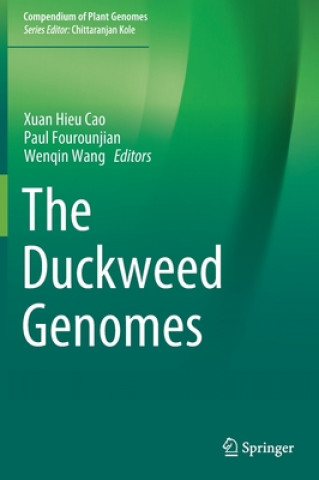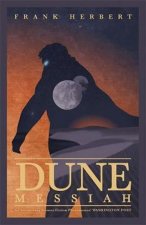
Code: 20942621
Duckweed Genomes
by Xuan Hieu Cao, Paul Fourounjian, Wenqin Wang
This book tells the story behind the first Spirodela genome sequencing project. Further, it describes the current genomics applications of these findings, and efforts to sequence new genomes within the family. The closing chapters ... more
- Language:
 English
English - Binding: Hardback
- Number of pages: 185
Publisher: Springer Nature Switzerland AG, 2019
- More about this

252.22 €

Low in stock at our supplier
Shipping in 14 - 18 days
Potřebujete více kusů?Máte-li zájem o více kusů, prověřte, prosím, nejprve dostupnost titulu na naši zákaznické podpoře.
Add to wishlist
You might also like
-

Spectre Rising
18.42 € -

THE AMERICAN SPEAKER: BEING A COLLECTION
28.56 € -

Prayer and Lifes Highest
42.49 € -

Rise And Rise Again
21.39 € -

Eton Alive
20.16 € -

Lobito's Gitarrenglück - Polish Edition
21.70 € -

Diamonds & Dynamite
15.35 €
Give this book as a present today
- Order book and choose Gift Order.
- We will send you book gift voucher at once. You can give it out to anyone.
- Book will be send to donee, nothing more to care about.
More about Duckweed Genomes
You get 623 loyalty points
 Book synopsis
Book synopsis
This book tells the story behind the first Spirodela genome sequencing project. Further, it describes the current genomics applications of these findings, and efforts to sequence new genomes within the family. The closing chapters address the sequencing of the over 1 Gigabase Wolffia genomes, which could have major impacts on genome evolution and agricultural research. The duckweed or Lemnaceae family is a collection of 5 genera and 37 species of the smallest, fastest-growing flowering plants. Many of these aquatic monocotyledonous plants can grow all over the world, in a variety of climates. Given their simplified and neotenous morphology, duckweeds have been researched for several decades as a model species for plant physiology and ecotoxicological research, contributing to our understanding e.g. of flowering response, plant circadian systems, sulfur assimilation pathways and auxin biosynthesis. In addition, duckweed-based treatment has been a favorite and feasible means, especially in developing countries, of removing phosphorus and pharmaceutical chemicals from sewage and wastewater. With a dry annual mass yield per hectare of up to 80 tonnes (equivalent to 10 tonnes of protein), duckweed is also a promising aquatic crop in new modern and sustainable agriculture. Besides being an excellent primary or supplemental feedstock for the production of livestock and fish, duckweed biomass can be utilized as a potential resource for human nutrition, biofuel, or bioplastics, depending on water quality as well as protein or starch accumulating procedures. These academic and commercial interests have led to international efforts to sequence the Spirodela polyrhiza genome, the smallest and most ancient genome in the family.
 Book details
Book details
252.22 €
- Full title: Duckweed Genomes
- Author: Xuan Hieu Cao, Paul Fourounjian, Wenqin Wang
- Language:
 English
English - Binding: Hardback
- Number of pages: 185
- EAN: 9783030110444
- ID: 20942621
- Publisher: Springer Nature Switzerland AG
- Weight: 624 g
- Dimensions: 254 × 178 × 17 mm
- Date of publishing: 14. July 2019
Trending among others
-

Dune
13.10 € -

Haunting Adeline
30.81 € -

Berserk Deluxe Volume 2
52.63 € -

White Nights
3.57 € -24 % -

Powerless
12.48 € -4 % -

Atomic Habits
15.97 € -15 % -

Dune Messiah
9 € -20 % -

Berserk Deluxe Volume 3
52.93 € -

One Day
12.59 € -13 % -

Berserk Deluxe Volume 1
44.43 € -13 % -

Iron Flame
16.27 € -19 % -

Surrounded by Idiots
10.13 € -16 % -

Harry Potter and the Prisoner of Azkaban (Minalima Edition)
27.84 € -32 % -

Gravity Falls Journal 3
22.01 € -

Heaven Official's Blessing: Tian Guan Ci Fu (Novel) Vol. 1
22.01 € -

The Creative Act
24.06 € -

Dune
9.72 € -19 % -

Hunting Adeline
31.84 € -

A Little Life
17.50 € -

Children of Dune
8.80 € -22 % -

Heaven Official's Blessing: Tian Guan Ci Fu (Novel) Vol. 2
25.28 € -

Bungo Stray Dogs, Vol. 8 (light novel)
16.07 € -1 % -

Percy Jackson and the Olympians 5 Book Paperback Boxed Set
47.81 € -

Solo Leveling, Vol. 1
21.50 € -

The Prisoner's Throne
10.64 € -21 % -

Court of Thorns and Roses
9.31 € -22 % -

Cry Baby Coloring Book
10.85 € -4 % -

Fourth Wing
16.68 € -16 % -

Icebreaker
9.41 € -16 % -

Berserk Deluxe Volume 6
47.81 € -6 % -

Avatar, the Last Airbender: The Kyoshi Novels (Box Set)
27.54 € -33 % -

The 48 Laws of Power
26.92 € -1 % -

House of Leaves
23.24 € -4 % -

Twisted Lies
9.72 € -19 % -

Dune Messiah
12.69 € -12 % -

No Longer Human
16.99 € -

48 Laws Of Power
22.62 € -5 % -

Twisted Games
9.41 € -22 % -

Caraval Paperback Boxed Set
39.83 € -8 % -

Solo Leveling, Vol. 2
22.42 € -

Open Circuits
34.40 € -16 % -

Berserk Deluxe Volume 5
51.30 € -

Heaven Official's Blessing: Tian Guan Ci Fu (Novel) Vol. 3
16.78 € -19 % -

Berserk Deluxe Volume 4
46.59 € -9 % -

Court of Mist and Fury
9.31 € -20 % -

SOLO LEVELING V08
22.42 € -

English File Upper Intermediate Multipack A (4th)
22.21 € -

CHAINSAW MAN V14
11.25 € -14 % -

Before the Coffee Gets Cold
10.44 € -20 %
Osobný odber Bratislava a 2642 dalších
Copyright ©2008-24 najlacnejsie-knihy.sk Všetky práva vyhradenéSúkromieCookies


 21 miliónov titulov
21 miliónov titulov Vrátenie do mesiaca
Vrátenie do mesiaca 02/210 210 99 (8-15.30h)
02/210 210 99 (8-15.30h)